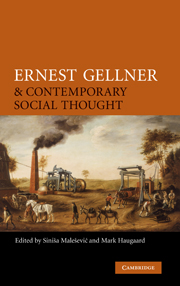Introduction: an intellectual rebel with a cause
Published online by Cambridge University Press: 22 September 2009
Summary
With his exceptionally independent and uncompromising mind, Ernest Gellner was a rare breed of intellectual. Unshakable in his defence of Enlightenment, and a self-proclaimed ‘rationalist fundamentalist’ (Gellner 1992: 80), Gellner had his fair share of followers and sympathisers. Yet he never really belonged to an identifiable collectivity, whether a religion, nation, state, class or status community, or indeed an academic school of thought, paradigm or intellectual circle. Even though, on a personal level, he missed the warmth of communal bonds as they extend beyond the immediate family circle, he remained an adamant ontological individualist in his academic, political and, to a certain extent, personal life. An intellectual maverick who openly expressed disdain for fashionable philosophies and hegemonic systems of thought, it is perhaps no surprise that he found himself on the fringes of the academic mainstream. In this sense he was a true intellectual rebel: a stubborn rationalist and materialist when the Wittgenstein-inspired idealism of linguistic philosophy was in its heyday; a liberal anti-Marxist and fierce anti-communist when Marxism and socialist ideals dominated British sociology; and an unyielding positivist and anti-relativist as postmodernist and poststructuralist thought rose to prominence in the fields of anthropology and cultural studies.
Yet despite, or perhaps because of, his lifelong defence of rationalism and individualism, Gellner's intellectual passion drove him to understand, to explain and to empathise with shared values, forms of life and ideological systems of belief that were otherwise alien to his own.
- Type
- Chapter
- Information
- Ernest Gellner and Contemporary Social Thought , pp. 1 - 28Publisher: Cambridge University PressPrint publication year: 2007

